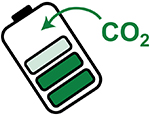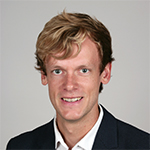 Dr. Alexander Forse
Dr. Alexander Forse
University of Cambridge, UK
Date: December 7, 2022
Time: 1300–1400h ET
Sponsor: Hiden Analytical
Electrochemical CO2 capture is rapidly emerging as a next generation technology for mitigating greenhouse gas emissions.1 In this presentation, I review recent progress from our research group on understanding and improving electrochemical CO2 capture by (i) carbon-based supercapacitors, and (ii) quinone-based batteries. Carbon-based supercapacitors benefit from their simplicity and sustainable materials, but a major challenge is to increase electrochemical CO2 capture capacities, which currently lag far behind those of quinone systems. I show that by varying the charging protocol, CO2 capacity increases can be obtained.2 At the same time, our measurements provide new insights into the molecular mechanisms of electrochemical capture, which may aid the design of improved systems. Secondly, for the case of quinone-based batteries, a major practical limitation is oxygen sensitivity. It has been proposed that this issue can be overcome by tuning the quinone chemistry, but there is a trade-off between redox potential and CO2 capture strength that we discuss here.3 I outline potential strategies to overcome performance trade-offs in electrochemical CO2 capture, and describe the advantages and disadvantages of different electrochemical CO2 capture systems.
An interactive Q&A session follows the presentation.
References
[1] Diederichsen, Sharifian, Kang, Liu, Kim, Gallant, Vermaas, Hatton, Nat Rev Methods Primers, 2, 68 (2022).
[2] Binford, Mapstone, Temprano, Forse, Nanoscale, 14, 7980-7984 (2022).
[3] Bui, Hartley, Thom, Forse, J. Phys. Chem. C., 126, 33, 14163–14172 (2022).
Benefits of attending the webinar
Learn about:
- How carbon-based supercapacitors and quinone-based batteries can be used to reversibly capture carbon dioxide;
- How these batteries and supercapacitors have different advantages and disadvantages for carbon capture;
- The research challenges that different electrochemical carbon capture technologies face today.
Dr. Alexander Forse
 Dr. Alexander Forse is Assistant Professor in Materials Chemistry at the University of Cambridge. The Forse Group researches new materials that help with climate change mitigation. Dr. Forse holds a UKRI (UK Research and Innovation) Future Leaders Fellowship and recently received the Anatole Abragram Prize for pioneering applications of NMR spectroscopy to the characterization of new materials for electrochemical energy storage and carbon dioxide capture.
Dr. Alexander Forse is Assistant Professor in Materials Chemistry at the University of Cambridge. The Forse Group researches new materials that help with climate change mitigation. Dr. Forse holds a UKRI (UK Research and Innovation) Future Leaders Fellowship and recently received the Anatole Abragram Prize for pioneering applications of NMR spectroscopy to the characterization of new materials for electrochemical energy storage and carbon dioxide capture.
Learn more about upcoming ECS Webinars and review our previous webinar recordings.
We thank our webinar sponsors who make these complimentary programs possible.
Interested in presenting in the ECS Webinar Series? Email your presentation title and abstract to education@electrochem.org for consideration.


